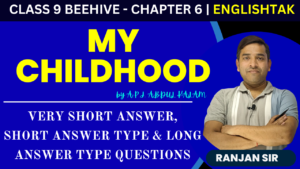![]()
Lost Spring Summary Class 12 English
Table of Contents
In this post, I am Lost Spring Summary Class 12 English which is beneficial for those students who are going to appear at the Class 12th board exam 2023-24.
Lost Spring About the Author
Anees Jung (b. Rourkela 1964), journalist and columnist for major newspapers in India and abroad, whose most noted work, Unveiling India (1987) is a detailed chronicle of the lives of women in India, noted especially for the depiction of Muslim women behind the purdah.
Theme of Lost Spring
Spring is the season of bloom. It’s compared to childhood, which is when life is just starting, like a bright future. Childhood means being innocent, strong, and full of energy. It’s also when we go to school and learn new things.
In ‘Lost Spring’ by Anees Jung, the story talks about kids who are stuck in poverty and treated unfairly. The two main characters, Saheb-e-Alam and Mukesh, don’t get to enjoy their childhood because they’re poor and can’t go to school. Even though their lives are tough, the author still sees moments of strength and hope in their difficult situations.
Justification of the Title
‘Lost Spring’ describes two stories of stolen childhood. Millions of poor children in India spend their childhood working in ragpicking or hazardous industries, instead of going to school. Childhood is the spring of life. But millions of unfortunate children
like Saheb and Mukesh are forced to spend this time either scrounging in the garbage dumps of Seemapuri or welding glass bangles in the blast furnaces of Firozabad. Their childhood is lost to the demands of survival. Hence, the title is quite apt.
Message of Lost Spring
The lesson ‘Lost Spring’ shares two ‘stories of stolen childhood’. The characters and places are different but the problem is the same. Thousands of Sahebs and Mukeshs are condemned to live a life of misery and exploitation. Grinding poverty and traditions compel children to work in the most inhuman and hostile conditions. The author succeeds in highlighting the plight of such unfortunate children.
Lost Spring Summary in English
‘Sometimes I Find A Rupee in the Garbage’ The author would come across Saheb every morning. She always found him searching for something in a heap of garbage. One morning she asked him, ‘‘Why do you do this?’’ He replied, ‘‘I have nothing else to do.’’ She told him to go to school but he said that there was no school in his neighborhood. She asked him whether he would study if she started a school. Saheb was happy. He said he would go to her school. But she had not actually intended on starting a school in the near future. She realised what an impact her casual words had on Saheb.
Saheb’s full name was Saheb-e-Alam meaning Lord of the Universe. The name was especially poignant, because the poor boy spent his days wandering barefoot along with other poor boys like him. The author talked to Saheb’s companions. One of the barefoot boys told her that it was their tradition to walk barefoot. But the author does not agree with them. She believes that a perpetual state of poverty is marked and passed on as tradition. Some children are lucky: Their prayer for shoes is granted but the ragpickers remain barefoot.
The ragpickers live in Seemapuri. Though Seemapuri is also in Delhi, there is a world of difference between the two places.
Like all other families in the area, Saheb’s family had also come from Bangladesh in the year 1971, because their homes and fields had been destroyed by storms. They had nothing to live on.
About 10,000 ragpickers live in Seemapuri. They live in mud structures with roofs of tin and tarpaulin. They lack all civic amenities like sewage and running water. However, they have voter identity cards and ration cards; this enables them to cast their votes and buy food. They move about and pitch their tents wherever they can find food. Ragpicking is their sole means of livelihood.
Saheb used to stand outside a club. He was fascinated by tennis and would watch people play. He also wanted to play. Someone had given him a pair of discarded tennis shoes. For him, this was a dream come true. Yet he did not see himself playing tennis as it was out of his reach.
Lost Spring Summary Class 12 English
Saheb got a job in a tea-stall. He was paid 800 rupees a month as well as all meals. Yet, he did not seem happy. He had lost his carefree life and his freedom. He was no longer his own master.
‘I Want to Drive a Car’
The author visited Firozabad — a city famous for its bangle-making industry. Almost every other family in Firozabad is engaged in making glass bangles. Glass bangles are regarded as an important symbol of a woman’s marital status.
Mukesh’s family was engaged in making bangles. Mukesh took the author to his house, walking through stinking lanes choked with garbage. Families of bangle makers lived there in the houses with crumbling walls and wobbly doors.
Mukesh’s house was like any other house in the lane. A frail young woman was cooking meals on a firewood stove. She was the wife of Mukesh’s elder brother. She was respected as the daughter-in-law of the family. Mukesh’s father also came in. The daughter-in-law covered her face with a veil as custom demanded.
Mukesh’s father was old and weak. He had lost his eyesight because of the dust from polishing glass bangles. He had worked hard all his life. But he could not afford to send his two sons to school. He could only teach them the art of making bangles; he had also built the house, but could not repair it.
Mukesh’s grandmother expressed her belief in destiny. She said that it was their karma (deeds) because of which they were born into the bangle maker’s caste. Thus, it was their destiny to suffer.
This belief that no man could change what was already decided by fate was shared by all the people of Firozabad.
Lost Spring Summary Class 12 English
Another woman told the author that despite working hard all their lives, they had never even had a full meal.
The author could see bangles everywhere. She saw boys and girls welding pieces of coloured glass. Their eyes would get used to the darkness and they often lost their eyesight before even reaching adulthood. At home, families worked hard all day in front of furnaces with high temperatures.
Such families, generation after generation, have been engaged in making bangles. They live in poverty, they work hard, and die in poverty. Nothing has changed with the passage of time. They find themselves in the clutches of middlemen and moneylenders. If the youth try to organise themselves, they are harassed by the police and the administration.
It is not easy for bangle makers to do something different because of the stigma of their caste. But Mukesh wants to be a motor mechanic. He wants to learn this work at a garage far away from home. He wants to be his own master.
English for Class 12th Board Exams
My Mother at Sixty Six Summary
The Last Lesson Summary in Hindi
The Last Lesson Difficult Words Meaning
Job Application Format Class 12
Letter to Editor for class 10 & 12





